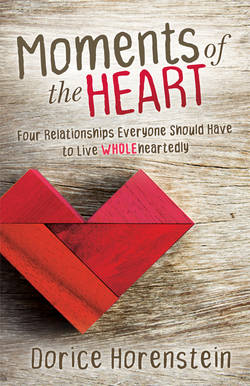Читать книгу Moments of the Heart - Dorice Horenstein - Страница 17
На сайте Литреса книга снята с продажи.
ОглавлениеKnow Your Roots!
If you haven’t figured out by now, I love the Hebrew language. No surprise, of course—I am, after all, an Israeli!
As I have mentioned before, Hebrew is a root-based language, meaning every word in the Hebrew language has three or four Hebrew letters that constitute its root. A combination of root letters can be shared in many different words, creating connection between words. This is something unique only to the Hebrew language.
Let’s take another example I love—the word masoret, which in English means “tradition.” The root for the word masoret consists of the three Hebrew letters mem, samech, and reish (). Masar, a word using the same three letters, means “pass forward.” These two words, masoret and masar, share the same root, which shows a connection between them and creates an additional layer of understanding into the Jewish tradition. The traditions we have grown up with are what we pass forward to the next generation, only for them to pass forward to the following one.
On the other hand, the word kadima in Hebrew, meaning “forward,” consists of three Hebrew letters kaf, dalet, and mem (). These three letters also combine to form a Hebrew word that means “ancient”—kadum. So it appears that two words with seemingly little in common—forward and ancient—have some hidden connection. When we walk forward, we take our past with us. When we practice our traditions (those which have been practiced by our ancestors), we pass them forward to the future.
The more you learn Hebrew, the more you will love it!
Your Personal Lev Moment
1 1.What traditions do you pass forward to your family? From whom did you learn them? Why do you still practice these traditions? How do they reflect your values? Which ones make you feel most proud? When you pass your traditions onto your family, what is their reaction? What are the ways you pass them on? Does your family find the traditions as meaningful as you do?
2 2.Can you create a new tradition to pass on to your children?
3 3.Let me share one tradition that is meaningful to my husband and me. We love celebrating Passover. We love the traditions, the food, the story, the concepts, the theme, and the time of year we celebrate this holiday. When we were growing up, even though we enjoyed our own family’s traditions, we wanted to create more meaningful experiences for our children. We modified our traditions a bit to better fit us so that we could pass them on to our children in more meaningful ways. Slowly, we incorporated more activities, stories, and songs. We even wrote questions which we sent to our guests to contemplate before coming over. We purchased fourteen copies of our favorite Haggadah (a book that tells the story of the Exodus), which our guests use (every two get one, encouraging them to connect and socialize further). Every year we take pictures and later insert them into the books. At the end of the evening, our guests write comments in the book (or send us an email later that we print out and glue on the pages of the Haggadah). Our children already have conversations deciding who will take these Haggadot (plural of Haggadah) once we stop hosting the Passover Seder gatherings in our own home. If that is not passing on the tradition and the excitement to the next generation, I do not know what is.
I hope this inspires you to create your own tradition, one that future generations will be so glad to receive!
| “For a righteous man can fall down seven times and rise.”–King Solomon (Proverbs 24:16) |
